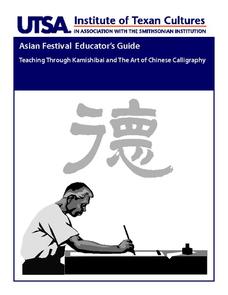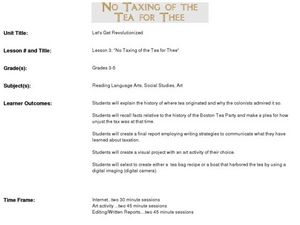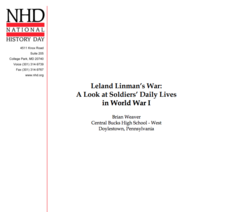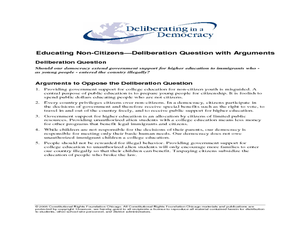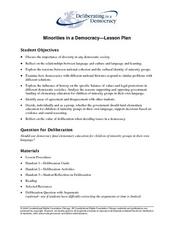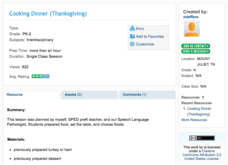All for KIDZ
Building Relationships: The Orphan of Ellis Island
Family and friendship are two very important themes of the historical fiction novel The Orphan of Ellis Island by Elvira Woodruff. From video clips and writing prompts to reader's theater and family interviews, this resource provides...
UTSA Institute of Texas Cultures
Teaching Through Kamishibai and The Art of Chinese Calligraphy
Young learners discover kamishibai, a popular Japanese storytelling art, and explore how these Japanese folktales illustrate the country's cultural themes and values through discussion and storyboarding.
MENSA Education & Research Foundation
Hurricanes
Learn the ins and outs of hurricanes through a series of lessons answering, "What is a hurricane? How does it travel? How is one formed, measured, and named?" Information is presented through informative text and images, while...
Foreign Policy Research Institute
Ancient and Medieval China
This is a thorough activity on Chinese history that includes readings from primary and secondary sources, guided reading questions, videos, and a take-home final assessment. While it indicates an audience from 9th through 12th grade, it...
Curated OER
Unit on International Monetary Fund and World Bank
High schoolers explore the purpose of the International Monetary Fund and the World Bank. For this global issues lesson, students participate in a role play activity that requires them to make funding decisions as members of the World...
Curated OER
Differing Federal Responses to the Great Depression: Letter Analysis
Young analysts examine two letters, one written by President Hoover and one written by FDR. Each letter contains that president's response to the role of the Federal Government during times of crisis (The Great Depression). They analyze...
Mrs. Hodges' Social Studies Classes
I Have Rights?!
Do young people have rights in the United States? Your pupils will not only learn the answer to this important question, but will also build vocabulary through cloze activities and gain a thorough introduction to the Bill of Rights.
Curated OER
Exploring George Washington's Leadership
Learners examine primary documents to determine whether or not George Washington was an honest leader. In this presidential history instructional activity, students evaluate Washington's leadership prior to and during his presidency....
Museum of Tolerance
Developing Media Literacy
To protect young people from questionable content, many schools limit access. This resource suggests that because learners can so readily avail themselves to unrestricted Internet access, it is vital for 21st century learners to develop...
Curated OER
Survivor Stories
Trace a survivor's story using a timeline, map skills, poetry and/or prose and photography, and make a visual representation of a survivor's journey through his or her life as a culminating activity for the class and the survivor. This...
Curated OER
The Boston Tea Party: Costume Optional?
Students investigate the events of the Boston Tea Party. They read and analyze first-hand accounts, answer discussion questions, develop a chart of facts, and create a newspaper article, letter, or factual report.
Curated OER
No Taxing of the Tea for Thee
Research the history of the Boston Tea Party. Learners read the book The Boston Tea Party and write down important facts. They use the Internet to continue their research and construct an art project of a boat that contains a tea bag.
Curated OER
Planning a Community Event
Students work together to organize a fundraiser. For this community event lesson, students work collaboratively to plan and organize a fundraiser. Students create a timeline, venue and advertisements for the event.
Curated OER
Anti-Semitism Workshop
Originating from the Yad Vashem Holocaust Memorial Museum in Jerusalem, here is a resource to support your world historians in their study of World War II, the Holocaust, your cultural scholars learning about anti-semitism, or your...
National History Day
Leland Linman’s War: A Look at Soldiers’ Daily Lives in World War I
Hunkering down in the trenches of World War I, Leland Linman decided to write a journal about his experiences. By reading Linman's entries in the fourth installment of an eight-part lesson series, scholars get a firsthand look at life in...
National Endowment for the Humanities
Lost Hero: Was John Hanson Actually the First President?
The first president of the United States was ... John Hanson? Scholars investigate the notion that the initial leader of the nation was not George Washington. Using research, articles, and open discussion, individuals create a quest for...
Curated OER
Famous Person: Yushiko Uchida
Third, fourth, and fifth graders read the book The Bracelet by Yushiko Uchida and examine the events of Uchida's life. They participate in a guided discussion of Japanese culture, perform a reader's theater, listen to a guest speaker,...
Deliberating in a Democracy
Educating Non-Citizens
High schoolers distinguish between the privileges of being a U.S. Citizen and privileges that are forfeited if not a U.S. Citizen. For this history lesson, students analyze the rights of people in a democratic society through research,...
Deliberating in a Democracy
Euthanasia
Learners analyze euthanasia as a possible way to die. In this controversial lesson plan, students reflect and discuss euthanasia as a possible way to enter death. Classroom discussion allows learners to voice their opinion and personal...
Deliberating in a Democracy
Minorities in a Democracy
Students consider diversity in democracies. For this democratic values lesson, students read an article titled, "Minorities in a Democracy." Students respond to discussion questions about the article.
Deliberating in a Democracy
Crime and Punishment
Should the United States ban the death penalty? Scholars use real-life examples of criminal activity to come to their own conclusions on the death penalty. Primary source documents, as well as video clips, open the issue of capital...
Curated OER
Lesson 3: Puns
Encourage more pun-derstanding of word play in your literary scholars as they explore Brian P. Cleary's book Rhyme and Punishment: Adventures in Wordplay. Although this isn't suggested, consider beginning this study by simply showing...
Center for Civic Education
The Power of Nonviolence: What Is Nonviolence? What Does It Cost?
Your young learners will delve into the language of primary source documents in order to identify the characteristics, benefits, and costs of nonviolence. The lesson plan includes a mix of activities, including an anticipatory activity,...
Scholastic
Cooking Dinner (Thanksgiving)
American traditions of Thanksgiving come to life through culinary activities. Young chefs practice cooking a turkey and setting a table for a Thanksgiving family feast. They use math and reading skills to follow directions and measure...



